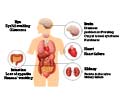A multicenter observational study called TRACS (Transthyretin Amyloidosis Cardiac Study) has been conducted in collaboration with researchers at BUSM

The researchers enrolled 29 patients with TTR cardiac amyloidosis due to either the V122I mutation or those with genetically normal TTR, and observed them for roughly 16 months. They found that Black patients with the mutation only survived for a median of 26 months after diagnosis, and that certain measured parameters including heart function by echocardiography, blood testing and exercise capacity fell during the study and were associated with survival. Quality of life determined by questionnaire also declined significantly. These findings currently appear online in the American Heart Journal.
"This study is important because it establishes that carriers of V122I are at increased risk of death from cardiac amyloidosis once they reach an age where the disease is expressed (generally over the age of 60)," explained lead author Frederick L. Ruberg, MD, assistant professor of medicine and radiology at BUSM. According to Ruberg these findings provide an important foundation on which future studies using new drugs can be based. "If patients on the new drug live longer or decline more slowly than those in TRACS, that would suggest a beneficial effect to treatment," he added.
Source-Eurekalert













